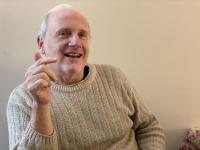Origin Story
Something called the Second Vatican Council had just convened the year before, in 1963, under the direction of a certain Pope known as John the 23rd. Or rather, XXIII. Since it was the “Roman Catholic Church,” we were supposed to use Roman numerals; this made sense.
Anyway, the Second Vatican meant, for one, that we could now have mass conducted in the “vernacular” when it used to be only in Latin, an otherwise “dead” language. (Bringing the dead back to life was a key Catholic concept, I would later learn; even later, I would learn it was a key concept just about everywhere long before Catholicism was concocted.) The phrase “Mass in the Vernacular” was printed at the top of every page in the Sunday missal we followed along with during mass. In italics: italics. I still remember sounding out ver-nac-u-lar and asking my mom what it meant. Four syllable words weren’t nearly as tough as Roman numerals—which I also asked and learned about from my parents, long before I learned, in public school, that the other kind of numerals were called “Arabic” and made you do things the Romans never dreamt of, like carrying a two to the next column.
Second Vatican also meant that now, instead of only organ-accompanied traditional hymns, we were going to have folk music every now and then. Yes, right during mass. It would be called a Folk Mass. Some grown-ups were aghast at this development; they might have been friends’ parents, though maybe they were priests, lectors, and Sunday school teachers. But folk masses weren’t held every Sunday, after all; besides which, there were always three or four other services to choose from every Sunday morning—and later, Saturday evening was added. That was Vatican II. We kids loved the music, of course, and I remember these masses being particularly well attended. I still have one of the LPs of a visiting group of guitar-strumming friars and can sing you one or two of their songs. An LP, by the way, is a Long-Playing record album made of vinyl—black plastic disc with a hole in the middle—that spins around on a turntable so you can hear music or comedy routines or whatever someone thought to record on it. I hope you knew that already, but if you didn’t, well, that’s OK. That’s what I’m here for, too.
Another new word Catholics in my home town and all over the world were having to learn because of Vatican II: ecumenicalism. Once again, it was my mom who told me what the five-syllable version, ecumenical, meant: having services with choirs from all the other churches that weren’t Catholic. In my home town this meant the Baptists, Congregationalists, Lutherans, and Episcopalians. (The nearest Methodist, Unitarian, and Greek Orthodox churches were in the city to the south, while a Dutch Reformed, I learned later when I got hired to play the organ there, was two towns in the other direction.) It was good to see school chums I’d never seen on Sunday mornings coming to my church, and for them to see me at theirs, for services. The pageantry was terrific, too, because each church’s choir had its own unique color for their choir robes. I still remember spotting Mrs. Roddenberry in a wave of Episcopalian purple as all the choirs filed past us down the center aisle. (Mr. Roddenberry was some kind of nephew to Gene, of whom you might have heard.)
Now, I remember one time being in the room and overhearing my cousin Catherine, who was four years older than me and probably four times as Catholic too, being aghast while reporting to some adult in some heated exchange that when she was a kid, the nuns actually taught that the _____s were damned! You can fill in the blank with just about anything but the word Catholic. She might have been having a delayed What the—? reaction, not too unlike mine. But that damnation idea was a lesson no longer being taught by the time I started Sunday school. Instead, the erstwhile “damned” were invited to sing along with us. This only seemed to confirm that my own first What the—? moment, about original sin, was helping to put me on the right track. I did not know what a conscience was, but it seemed I was already starting to have one.
Nor had I the slightest idea what a revolution was, but we were all, indeed, in the midst of one.

James B. Nicola’s poems have appeared in the Antioch, Southwest and Atlanta Reviews; Rattle; and Barrow Street. The latest three of his eight poetry collections are Fires of Heaven, Turns & Twists, and Natural Tendencies. His nonfiction book Playing the Audience won a Choice magazine award. A graduate of Yale, he has received a Dana Literary Award, two Willow Review awards, one Best of Net, one Rhysling, and eleven Pushcart nominations—for which he feels both stunned and grateful.


